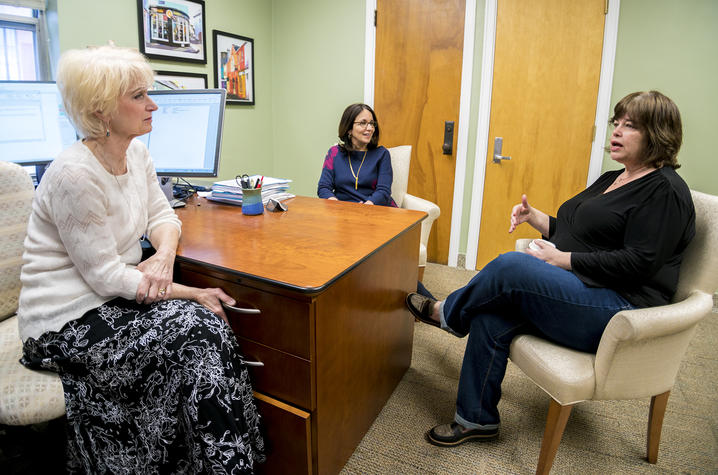UK Research Shows Benefits of Therapeutic Horticulture at Women's Shelter
LEXINGTON, Ky. (May 11, 2017) — Many people who garden or grow their own food can attest to the therapeutic benefits of being in nature and tending to plants. Now, a local women’s shelter is witnessing firsthand the healing powers of farming and is working with University of Kentucky researchers to further develop this program and assess its impact.
GreenHouse17 is a shelter for victims of intimate partner violence and their families serving Lexington and 16 surrounding counties in central Kentucky. Originally known as the Bluegrass Domestic Violence Program, the organization grew into what is now a facility located on 40 aces of farmland in rural Fayette county. The new location has offered opportunities for survivors to heal in the fresh air while assisting on the farm for a weekly stipend.
“I think (the farm program) has really changed our program in its entirety,” said Diane Fleet, assistant director of GreenHouse17. “Women are involved and take leadership roles. They make decisions about how programming goes, what a product should be called, and what we’re going to produce. We’ve started seeing more confidence being built in women in making decisions around their lives when they were allowed to do those things.”
GreenHouse17 staff clearly noticed the impact the farm project was having on the women and their children at the shelter – they appeared to be recovering more quickly from their trauma. Women who were dealing with substance use problems also seemed to be especially drawn to the project. Under the leadership of Executive Director Darlene Thomas, Fleet and her staff began looking for ways to evaluate this process of integrating farm-type activities within a shelter, where the primary goal is to help battered women recover, stabilize and become self-sufficient.
“We talk anecdotally about what happens at GreenHouse17, but I think to have research behind it really gives us some leverage as we’re competing for dollars,” Fleet said.
That’s where UK faculty had an opportunity to help. Fleet and her team decided to form a research-practitioner partnership with researchers from UK’s Center for Research on Violence Against Women (CRVAW), since their missions were so closely aligned.
“We are here to do research on all aspects of violence against women, with the goal of preventing it,” said Claire Renzetti, the Judi Conway Patton Endowed Chair in CRVAW, and professor and chair of sociology in the UK College of Arts and Sciences. “So it fits in perfectly with that mission, and also our goal of being part of the larger Lexington community.”
Renzetti also stressed the importance of presenting empirical evidence to back up success stories, for the sake of securing funding for the shelter and its program.
“We thought this was a great partnership between the center and the shelter, in that we could learn about the effects of therapeutic horticulture, which is important in terms of research and understanding recovery and resilience; and at the same time, help the shelter apply for additional funding to sustain that program,” she said.
CRVAW applied for funding through the Department of Justice to assess the impact of GreenHouse17’s farm project, and were surprised to receive more money than they initially asked for.
“This is unheard of, but they felt that we needed a little more in order to be able to really do what we wanted to do. They recognized the value of the project,” Renzetti said.
The two-year, $450,000 grant is now allowing Renzetti and Diane Follingstad, director of CRVAW, to conduct a quasi-experimental design that measures the effectiveness of the farm project. They are comparing outcomes between a group of women who participate in a six-week therapeutic horticulture program with a group who stay at the shelter but do not participate in the farm activities. The grant allows the researchers to offer incentives to women who choose to participate in the program, which helps attract a large enough pool of people to properly measure the program’s impact.
“If we can demonstrate that a six-week involvement in a therapeutic horticulture project can benefit these women – psychologically, physically, mentally – then that is very important information,” said Follingstad. “If this therapeutic horticulture experience helps these victims change, grow, heal; then it definitely meets our center’s mission.”
“That's not just the mission of the center. That's the mission of the University of Kentucky; to serve the commonwealth and beyond,” Renzetti said.






